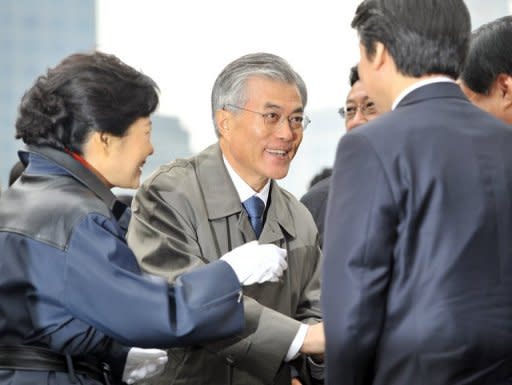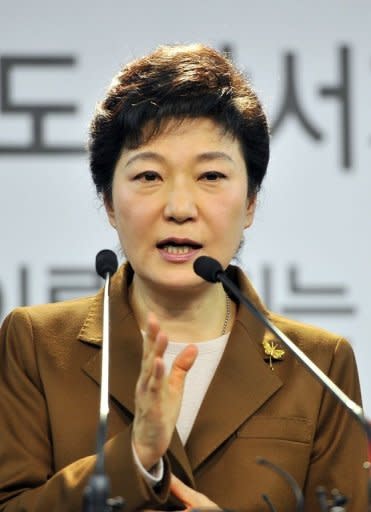South Korea election goes one-on-one
The sudden withdrawal of software mogul Ahn Cheol-Soo means South Korea's presidential race now begins in earnest, with voters facing a straightforward and familiar liberal-or-conservative choice. Ahn, who had run as an independent championing political and economic reform, stepped down late Friday to throw his support behind Moon Jae-In from the left-leaning main opposition Democratic United Party (DUP). Moon's most pressing task is to win over the support base left by Ahn's sacrifice and gather the maximum momentum going into the December 19 ballot against conservative front-runner Park Geun-Hye. "We all owe a huge debt to Mr. Ahn. I feel both sorry and grateful to him," the 59-year-old Moon said after Ahn's unexpected announcement on Friday. While Moon shared Ahn's stance on key issues like reforming South Korea's giant, family-run conglomerates, observers say he would be unwise to assume the automatic backing of those galvanised by Ahn's independent campaign. The two men had come under intense pressure to merge their campaigns -- to avoid splitting the liberal vote and handing Park the presidency -- but their negotiations over who should step down were difficult and, at times, acrimonious. Ahn, who had painted himself as an outsider untainted by party politics, was enormously popular among young liberal voters. His withdrawal was a disappointment to many seeking an alternative to the entrenched left-right divide represented by the established political parties. "Ahn's voluntary withdrawal from the campaign put the political establishment to shame," Park Kie-Duk, a political analyst at the Sejong Institute, told AFP. "The important thing now is for Moon to smooth the ruffled feathers of Ahn's supporters," Park said. Although Ahn endorsed Moon and called on his supporters to help defeat Park Geun-Hye from the ruling New Frontier Party, it remains to be seen just how far he will go in actively campaigning for a candidate whose commitment to political reform he has called into question. "Ahn will publicly express his support for Moon once or twice more before the election, but he will restrain from stumping for Moon," suggested Kang Won-Taek, a political science professor at Seoul National University. "Chances are he will try and forge a separate political group," Kang said. According to the polls, Park would have easily won in the event of a three-horse race, but they put her neck and neck in a face-off with either Moon or Ahn. In stark contrast to Ahn, the two remaining candidates are closely associated with former presidents from opposite sides of South Korea's political spectrum. Park is the daughter of South Korea's former military strongman Park Chung-Hee, credited as the architect of South Korea's economic boom but still despised by some for his repressive rule. Moon, who was chief of staff in the administration of former liberal president Roh Moo-Hyun, was jailed in the 1970s for protesting against Park Chung-Hee's authoritarian regime. Moon has made it clear that he favours closer ties with North Korea and would reverse outgoing president Lee Myung-Bak's policy of linking economic assistance to progress in talks on Pyongyang's nuclear programme. Ahn's withdrawal has ensured that the December 19 ballot will be close, although polls suggest Park still has the edge, especially if some of Ahn's disappointed supporters baulk at switching their allegiance. "Park is likely to win the final race with a narrow margin," said Shin Yul, a political science professor at Myongji University.




